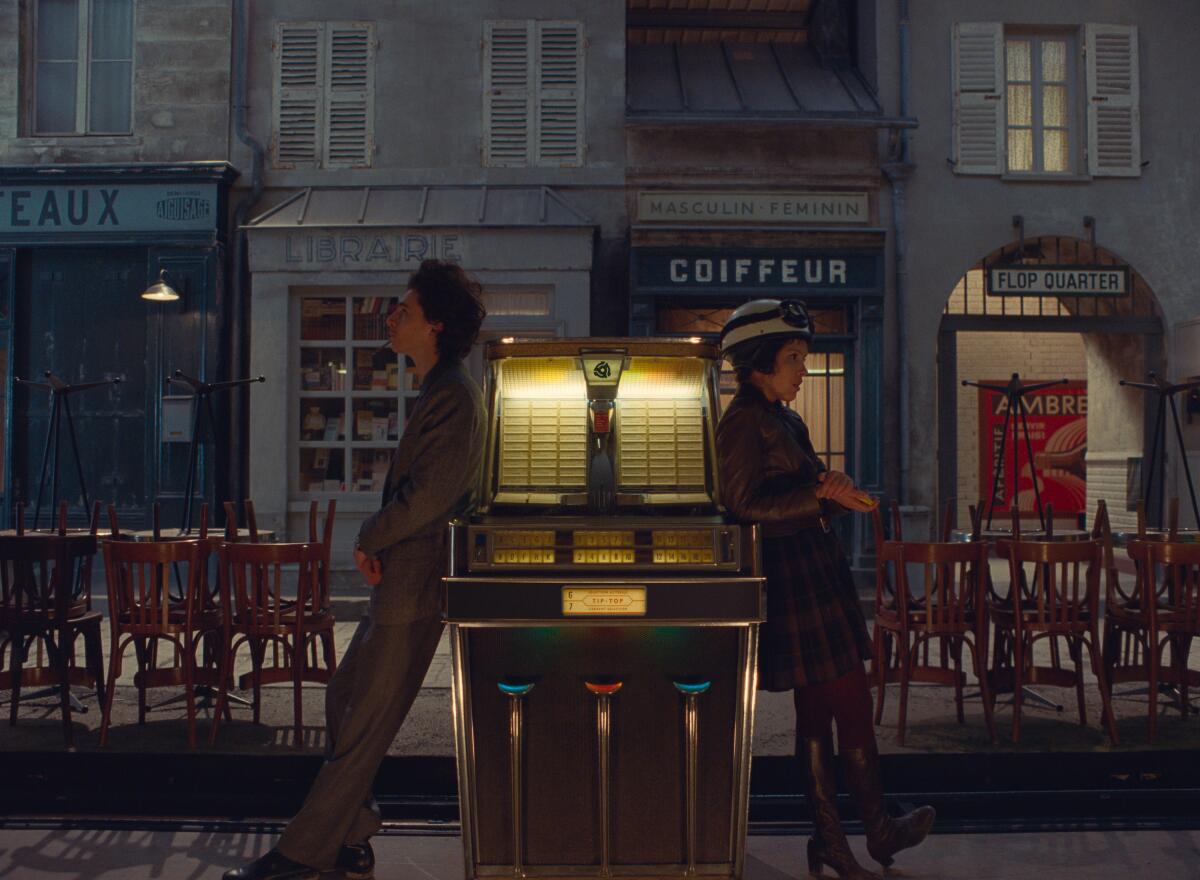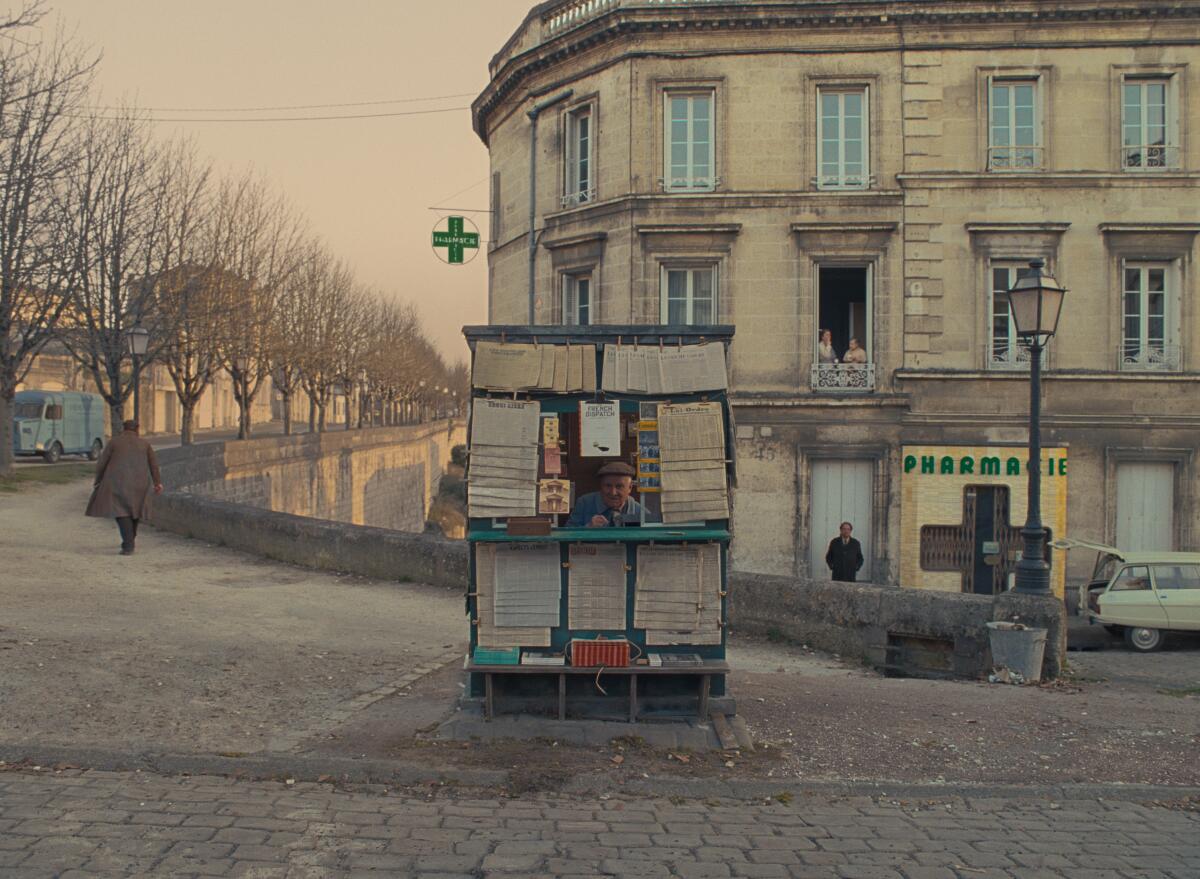Defining ‘Andersonian’: Inside the music of Wes Anderson’s ‘The French Dispatch’

“It’s Wes’ world.”
These words from composer Alexandre Desplat succinctly describe the filmmaking of Wes Anderson. The latest of Anderson’s unmistakable and idiosyncratic creations, “The French Dispatch,” finally reached theaters last week, posting the highest per screen average for a specialty release in the pandemic, and goes wide Friday. Three of the key collaborators behind the music of the movie recently discussed just how that particular part of Anderson’s highly specific world came together.
Desplat has composed multiple scores for Anderson, winning an Oscar for his work on 2014’s “The Grand Budapest Hotel.” Music supervisor Randall Poster has worked with Anderson since his first feature film, 1996’s “Bottle Rocket.” Jarvis Cocker is best known as the frontman for the Britpop sensation Pulp before launching a successful solo career. Cocker voiced a character in Anderson’s 2009 animated film “Fantastic Mr. Fox” and worked on a “French Dispatch” companion album of covers of French pop songs titled “Chansons d’Ennui” under the name of a fictional popstar Tip-Top referenced in the film.
An anthology of stories structured like a magazine, “The French Dispatch” tells the tale of a “New Yorker”-esque English-language publication based in the fictional town of Ennui-sur-Blasé, France. An art critic (Tilda Swinton) describes a madman artist (Benicio Del Toro) and his prison guard muse (Léa Seydoux). A journalist (Frances McDormand) assists a young student revolutionary named Zeffirelli (Timothée Chalamet). A food writer (Jeffrey Wright) becomes entangled in a kidnapping plot. The cast is bursting with recognizable actors, including Bill Murray, Owen Wilson, Willem Dafoe, Elisabeth Moss, Edward Norton, Tony Revolori, Bob Balaban, Lyna Khoudri, Stephen Park and, in a role billed only as “Junkie/Showgirl #1,” Saoirse Ronan.
“He’s going to a world of his own and I like being part of it,” said Desplat. “There is this sense of humor, a lot of poetry and it’s dreamlike. It’s unpredictable, it is a world where the history of cinema is very present. But the music we try to create together is not referential. We always try to have it like another flavor not yet in film.”
At this point in their ongoing collaboration, Anderson sends both Desplat and Poster the script before shooting has even begun. For “The French Dispatch,” Desplat paired acclaimed pianist Jean-Yves Thibaudet in unusual duets with harp, tympany, bassoon or tuba, drawing from a wide range of references, including Erik Satie and Thelonious Monk.
During a recent interview from Paris, Desplat described the collaborative process with Anderson, saying, “I start writing music, I play my little sketches to him. And from these sketches, he gives me notes. We amend, we explore, we expand the ideas. Then it’s a back and forth situation. He goes back to his editing room and we start fiddling around with all the elements. And then I bring the final touch, the last whipped cream and the little nuts and the cherries to fix the final cake.”

In the section with McDormand and Chalamet, titled “Revisions to a Manifesto,” the Chantal Goya song “Tu m’as trop menti,” also heard in Jean-Luc Godard’s aching 1966 portrait of young lovers, “Masculin Féminin,” is used, expanding the matrix of references. Among the songs covered by Cocker as Tip-Top is “Mao Mao,” originally performed by Claude Channes in Godard’s 1967 satire of student revolutionaries “La Chinoise.”
Anderson’s “The Life Aquatic” featured the Brazilian musician Seu Jorge singing samba arrangements of David Bowie songs. So the idea of having Jarvis Cocker tackle a survey of French pop classics wasn’t entirely without precedent within Anderson’s musical ecosystem.
The filmmaker had used French pop music before in the memorable moment from 2012’s “Moonrise Kingdom” when two teen runaways dance on a beach to Françoise Hardy’s “Le temps de l’amour.” The Joe Dassin song “Les Champs Élysées” plays during the end credits of 2007’s “The Darjeeling Limited.”
The “Chansons d’Ennui” album serves as a primer survey on French pop, including songs originally sung by Hardy, Serge Gainsbourg, Brigitte Bardot, Jacques Dutronc, Brigitte Fontaine, Alain Delon and others.
“I wanted it to be a kind of sincere love letter to French pop music,” said Cocker recently from England. “I didn’t want it to be in any way kind of a pastiche-type thing. And that also meant that I had to work on my French pronunciation and stuff like that. So that to a French person listening to it, they wouldn’t listen and think, ‘Oh, that’s disrespectful’ or ‘That just doesn’t make sense.’”
Laetitia Sadier of the group Stereolab served as a coach for Cocker’s French pronunciation, sings a duet on “Paroles, Paroles” and also helped translate the Nino Ferrer song “Looking for You,” which was originally sung in English, into a French version titled “Amour, Je Te Cherche.”
Cocker noted, “That’s the really, really, really embarrassing part of it all because I studied French in school, I married a French woman, I lived in Paris for quite a long time, but actually my spoken French is pretty atrocious. So that’s why I needed to have this coaching from Laetitia so I can make myself kind of understood. It is a source of strain for me that my grasp of the French language is not better than it is.”

The only Tip-Top song actually heard in “The French Dispatch” is Cocker’s version of “Aline,” a 1965 hit for the singer Christophe, who died in April 2020. “Aline” is a song that Poster says he and Anderson have been looking to place in a film for years, just waiting to find the right spot for it. (Currently shooting his next film in Spain, Anderson was unavailable to comment for this article.) Anderson uses the song’s stabbing, soaring strings multiple times in a number of different emotional contexts.
“That song is so distinctive. And in America or in some other countries, it’s a rarity and it’s a song that everybody’s going to discover from this movie,” said Poster in a call from New York. “In France, it’s almost like a national anthem, everybody knows Christophe did ‘Aline.’ And we do have a French audience so we can’t use Christophe’s ‘Aline’ because everybody will know that it’s Christophe.
“So that kind of obviated the choice of Jarvis,” said Poster. “And really the Tip-Top record was born out of the fact we were recording it in London with Jarvis and we’re like, ‘This is so great. Let’s do a whole record, a whole Tip-Top record.’ And then the three of us just had a fun time picking songs and talking about it.”
In the film, Tip-Top is seen fleetingly as a painting created by illustrator Molly Rosenblatt, the same image used as the cover for the album.
“I didn’t know whether there was actually going to be a person that was Tip-Top in the end,” said Cocker. “Tip-Top is an idea more than a real presence. I think this idea came about that because when you see a little shrine outside the cafe, there’s an album cover and it’s a Tip-Top album. And so I guess what Wes wanted to do was say, ‘Wouldn’t it be nice if that record really existed?’ So I tried to approach it as if it was Tip-Top’s greatest hits album.”
Cocker first met Anderson in passing while deejaying at the a premiere party for Anderson’s film “The Royal Tenenbaums” in London. But the two more properly met and became friends after Cocker was DJing the wrap party for Sofia Coppola’s “Marie Antoinette” in Paris. The two began to trade songs back and forth, sharing new discoveries.
“He’s got good taste in music,” said Cocker. “I mean, for instance, that song ‘Aline’ that we do. So he played me that song before, I knew that was one of his favorite French pop songs. He just played me that as a thing of like, ‘Hey, listen to this song that I really like.’ And then years later he obviously thought it would be the song to use in that particular sequence in the film.
“So I was kind of flattered they asked me to do a version of it, because he could have just got a French person to do it, which would have probably been the more obvious thing to do,” Cocker said. “I think that’s often the way, not only with music choices, but Wes is very particular in what he puts in his films, the way that he meticulously puts together a scene. He doesn’t always put the most obvious things.”
The song selection is a mix of well-known tunes and obscurities. Anderson and Poster were pulling to include a song by the French folk chanteuse Barbara, but Cocker could never land on a song of hers he felt he could properly sing.
“We’ll get there,” Poster said. “We’ll get Barbara on something.”
If “Chansons d’Ennui” becomes a gateway for audiences to newly discover the original artists and songs, that would be ideal.
“There are songs that maybe people might have heard, like the Serge Gainsbourg ones, and then I think there’s stuff that people won’t be as familiar with,” said Cocker. “If it’s a kind of starting-off point for people to then investigate, then I think I would feel very happy about that. French music has meant a lot to me.”
“I absolutely love it. It’s one of the great pleasures of my life,” said Poster of potentially bringing this music to new audiences as Anderson’s soundtracks have previously renewed interest in a wide array of artists. “That we brought different pieces of music to people who otherwise wouldn’t get to them, that’s just such positive feedback, as people just love these songs, whether it’s ‘Ooh La La’ at the end of ‘Rushmore’ or all the British pop that we put in there that people really didn’t know or Indian film music or the Kinks or yodeling.”

Cocker recalled that one of the songs on the album, Hardy’s “Mon amie la rose,” was one he discovered on an album he first found in a junk shop while still in school in his native Sheffield, England.
“I’ve carried that song around with me for a long time and I’ve always liked the mood of French music,” he said. “And then when I did start to try and learn what the words were about, often you would find that the lyrics were quite unusual. Like that particular song is about a guy going into his garden and then he starts talking to a rose that’s growing in the garden. The rose kind of delivers this speech about the fragility and fleeting nature of existence. So that’s not really the subject matter that you find cropping up in English or American pop songs.
“They really try and get into the emotion of the drama and I liked the fact that they’re willing to go there,” he said. “Even ‘Aline,’ the guy is on the beach, he’s drawing a picture of his sweetheart in the sun, then there’s a storm and she disappears. Has she drowned? And he’s running up and down the beach, screaming the name saying, ‘Come back.’ It’s quite a high-drama situation.”
Working with the same musicians who played on the “Chansons d’Ennui” recordings and his recent “Beyond the Pale” album, Cocker and his band performed a set of Tip-Top songs at a party following the recent London Film Festival screening of “The French Dispatch.” He said he will likely include a few of the songs in his upcoming tour and would ideally like to perform a Tip-Top set at least once in Paris.
Both Desplat and Poster are working on Anderson’s next film but are completely mum on any details. In talking about tracks from soundtracks by composers such as Georges Delerue and Ennio Morricone that are used in “The French Dispatch,” Poster attempted to define the worldview exhibited by the way music is used in the movies of Wes Anderson.
“I think they’re recontextualized really,” said Poster. “I think that those musical voices are consistent with being Andersonian.”
Asked to further define what that concept means, Poster said simply, “That is a music that is a perfect complement to the moment in the movie. That’s how I would describe ‘Andersonian.’”
More to Read
Only good movies
Get the Indie Focus newsletter, Mark Olsen's weekly guide to the world of cinema.
You may occasionally receive promotional content from the Los Angeles Times.







